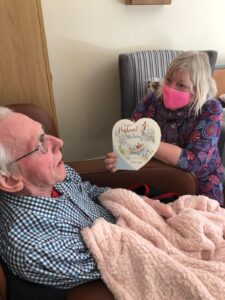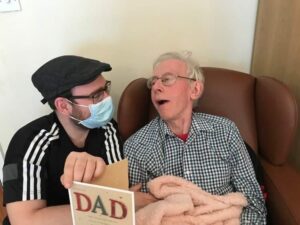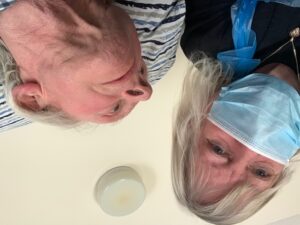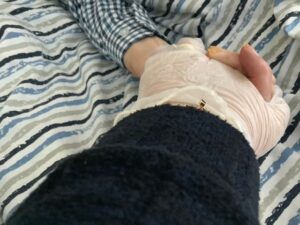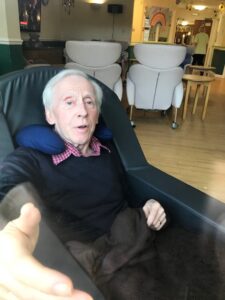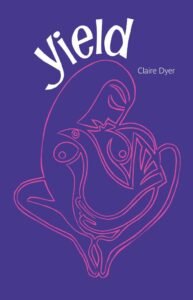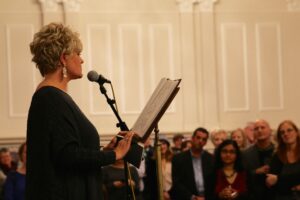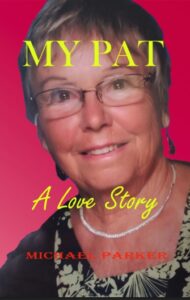Sunday and it’s Bob’s birthday. I have been preparing for a while. What can I do to make it special in his room and something he might recognise as a birthday? He doesn’t recognise me let alone anything else!
The caterpillar cake is a must, we often had one for our boys’ birthdays and for parties of any kind even when they were grown up. Maybe he might have a memory of those days. A ‘Happy Birthday’ balloon . He can read the words even if he doesn’t understand the meaning. I could tie it to his bed and it will look jolly. Obviously chocolate buttons – he associates them with my visits. I break them in half and they melt on his tongue. Lots of cards. Several have already come in the post. I will open them for him and read them to him, coaxing memories of each and every sender. A bottle of Prosecco. He loved it last birthday although I had to watch through a window last time. And, the best news of all, our eldest son Joe can also come with me for the first time, at the same time. A whole two hours all together. What a bonus!
The morning started with our two friends delivering some gifts. A beautiful soft blanket and a 1970s football sticker book with all references of Arsenal clearly ear-marked with post it notes for me to read and show to him. How unbelievably thoughtful. How kind. Another present arrived on the doorstep a bottle of port. Two kind friends knew it was Bob’s favourite tipple and that I give him some in his beaker sometimes. Then another wonderfully thoughtful gift, a box of hot chocolate sachets. Bob’s favourite hot drink. Do they know how much their kindness buoys me up. I hope so.
Even Joe’s school friend and her little girl write and send a lovely card. Always supporting us and so kind and positive.
I am filled with a strange mixture of joyful anticipation tinged with anxiousness. I so want it to go well. I’m desperate to have a shared moment where he comes back to me. Even for a moment.
I really have thought of everything candles, knife for cake, napkins, cupcakes for the carers, bottle of fizz, presents, cards, chocs and the music playlist.
We have our lateral flow tests and wait 30 minutes. It’ll be ok, I have so many tests every week and a PCR and I’m very careful in my daily life.
Exactly 30 minutes after the negative test we are allowed in. Straight through the corridor to his room. Bob is sat in his chair next to his bed. Quiet, deep in his thoughts.
‘Hello, darling, Happy Birthday.’
‘ Happy Birthday, Dad! ‘
Vacant. This is going to be a bit of a struggle I thought, but I’ll get there by the end of the two hours. He’ll smile, or stare intently at my face or just hold my hands.
Joe will talk to him about Arsenal and he’ll repeat the names of players. I give him the blanket and tuck him in his chair with it. He clutches tightly at it. It’s lovely and soft. That’s a hit, I think.
I get his chocolate buttons and put a few in his mouth. He likes them. His mouth opens again signalling he wants more. I cut the cake. We have a piece each. I cut Bob’s bit into small squares. I tell him it’s birthday cake and it’s delicious. He takes it all on his tongue bit by bit and I put the drink in his beaker and tilt it so he can sip it.
‘ Bubbles’ he exclaims.
I’m so happy he’s remembered the bubbles. He enjoys a full beaker of Prosecco.
Then the cards. He cannot hold them or tear them open so I do that and read each one. The first is from Eddie, our youngest son.
‘ Look Bob, this is a nice card, it has a bear on it and it says Big Bear hugs. It’s from Eddie. He’s your boy and he’s in Australia. He loves you very much and sends you a big kiss’
Suddenly Bob shouted out, ‘ Come now, come now’ . How amazing, he’s making sense and he wants to see Eddie. I said that we would ring him and he’d see him and talk to him. COVID-19 has made it impossible for our son to get home to see his Dad so this is all we can do.
The next card is from Bob’s brother and he’s sent him some photocopies of some pictures when he was young. How thoughtful. I show Bob and provide the narrative. I place all the cards on his windowsill. The bed is facing the windowsill so Bob will be able to see them from his bed or chair.
‘ Hip, hip, hooray,’ Bob says randomly. I wonder where that’s from and then realise he’s reading one of the cards. On the front it says ‘ Hip, Hip, Hurray, it’s your birthday’.
So I play the music. All picked as ‘our tracks’ or something that Bob loved. The Beach boys, David Bowie, ELO, and lots of Motown. I joke about me always bringing him good music and we have our own private disco. I dance about the room and we laugh and sing. Sometimes Bob calls out randomly. Or he makes sounds like he’s trying to sing. He tells me to ‘ Be careful’ . I tell him I will be. He starts to count, out of sequence, random numbers.
Music is the key that unlocks him. He tries to sit up and opens his mouth for a kiss. I kiss him and put my arms around him. I tell him I love him and he looks at me smiling and says, ‘She’s happy’.
I show him the pictures of us in his memory book.
Then he has us in stitches. ‘ There’s two of them’ he says pointing at the cushion that has a picture of me and Bob on. He’s saying there’s two Chris’s – me and the one on the cushion. I tell him there’s only one of me! But we all have the giggles. Bob too because he’s joining in with us.
Joe holds his hand. It is a good visit. I think Bob has enjoyed it.
We tidy up and get ready to leave. I kiss him again lots of times and he suddenly says out of nowhere, ‘ You’re my wife. ‘
The tears flow. I can’t believe he’s said it. The carer comes back and my eyes are filled with happy tears.
‘Are you alright?’ she asks.
‘ Yes, I’m just a bit emotional. He’s just said I’m his wife and for that moment he knew me.’
Wonderful memory that will sustain me for a little while.
Happy Birthday, Bob. We had a good afternoon didn’t we?

